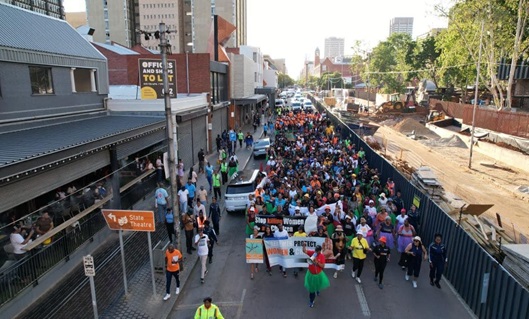
The 16 Days of Activism Against Gender-Based Violence is a global campaign initiated by the United Nations to address violence affecting vulnerable groups, including women, children, people with disabilities, the LGBTQ+ community, and the elderly. This annual initiative runs from 25 November (International Day for the Elimination of Violence Against Women) to 10 December (International Human Rights Day). Its primary objective is to foster collective action against the pandemic of gender-based violence (GBV).
This year, the Gauteng Provincial Government and the Department of Community Safety marked the launch with a night vigil held at the Union Buildings in Pretoria. The event commemorated 26 years of South Africa’s participation in the campaign under the theme: “30 Years of Advancing Collective Action to End Violence Against Women and Children.” The theme underscores the importance of a united societal response to combat GBV.
The launch began with a march against Gender-Based Violence and Femicide (GBVF), starting from Tshwane House and ending at the Union Buildings. The vigil, which started at 6:00 PM on 25 November and concluded at 4:00 AM the next morning, saw participation from prominent leaders, including:
Premier Panyaza Lesufi •
Deputy Minister of Women, Youth, and People with Disabilities, Ms Mmapaseka Letsike •
Gauteng MEC for Health, Ms Nomantu Nkomo-Ralehoko •
MMC for Public Safety, Dr Mgcini Tshwaku •
Mayor of Tshwane, Dr Nasiphi Moya •
In addition to government officials, representatives from NGOs, GBVF brigades, and faith-based organisations were present to show solidarity with survivors and victims of GBV.
Dr Nasiphi Moya highlighted the grim reality of gender-based violence, citing national crime statistics from April to June 2024:
93 women murdered •
212 attempted murders •
704 rapes reported •
16,933 women and girls assaulted, with 4,048 cases of grievous bodily harm •
She also referenced a report from Public Protector Kholeka Gcaleka, which criticised the South African Police Service (SAPS) for mishandling GBV cases. Some officers were reported to force victims to serve interim protection orders themselves or discourage them from pursuing their cases. Dr Moya called on parents and communities to remain resilient and support victims in seeking justice.
Premier Lesufi urged the government, NGOs, and the public to devise creative strategies to combat GBVF. He identified drugs, alcohol abuse, and the prevalence of weapons as key drivers of violent crime. “We must change societal attitudes and foster a culture of respect and safety for all,” he stated.
Colonel Mekgwe of the Family Violence, Child Protection, and Sexual Offences (FCS) Unit detailed the unit’s ongoing efforts, including:
22 units serving all 146 police stations in Gauteng •
97 planned GBV awareness campaigns during the 16 Days of Activism •
The introduction of soccer matches to encourage dialogue on sensitive issues •
Colonel Mekgwe celebrated the FCS unit’s success in securing the conviction of South Africa’s most notorious serial rapist, sentenced to 42 life terms and 791 years in prison. He noted that while rape cases have decreased in Gauteng, much work remains, with 10,621 cases of rape and sexual assault reported between October 2023 and October 2024.
Faith-based leaders delivered prayers and messages of hope to survivors and families of victims. Choirs and poets from across Gauteng offered heartfelt performances, adding to the spirit of the event.
The launch concluded with a resounding call for everyone to play their part in ending gender-based violence. South Africans are encouraged to report GBV to social workers, police stations, or the 24-hour GBV Command Centre Hotline: 0800 428 428.
This year’s campaign serves as a powerful reminder that no one is alone in this fight. By working together, society can create a future where women, children, and all vulnerable groups are safe and empowered to thrive.
INFO SUPPLIED.

